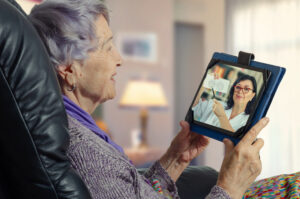
When a person is sick and needs immediate care, many think to go to the emergency room. That is the place where care is provided 24/7, and if the ER can’t solve the problem right away, there’s an entire hospital attached that can.
But the ER is also riddled with issues. It can be expensive, wait times may be long, and people are surrounded by other sick patients.

With the Rise of AI, What IP Disputes in Healthcare Are Likely to Emerge?
Munck Wilson Mandala Partner Greg Howison shared his perspective on some of the legal ramifications around AI, IP, connected devices and the data they generate, in response to emailed questions.
Troy, New York-based UCM Digital Health is trying to create the ER experience, but through a digitally integrated platform, said cofounder and CEO Keith Algozzine. This means that instead of going to the ER, patients start through UCM’s app, website or by phone. Based on the initial interaction, patients will be directed virtually to the kind of care they need. For example, if someone requires care for mental health, they’ll be connected to a mental health clinician.
“Very quickly, we’re getting the patient to a clinician, our clinician,” Algozzine said. “We hire them, we train them. We’re a full 50-state, 24/7 medical practice.”
Then the clinician can provide the care the patient requires, such as a prescription. If the clinician isn’t able to provide the needed care right away, they’ll connect the patient to another part of UCM Digital Health’s ecosystem where they can receive that care, much like an ER would do in a hospital. If in-person care is required, patients will be referred to that.
UCM sells its solutions to employers, health plans and providers at risk. It charges its clients in various models, such as fee-for-service or capitation rates, Algozzine said.
The company’s competitors include other telemedicine platforms like Teladoc, though the company differs by integrating outside the ER and primary care area to provide whole-person care, Algozzine claimed.
The company was founded in 2015 but skyrocketed in revenue at the start of the pandemic, Algozzine said. Before the pandemic, it had a couple hundred clients servicing about 1 million lives, and now has more than 650 clients servicing about 5 million lives. The company received $5.5 million in 2021 in series A funding from Armory Square Ventures, as well as Contour Ventures and River Park Ventures.
The reason for the increase in clients is that Covid-19 spurred many employers to add multiple point solutions to their benefits packages for employees, but it eventually became too difficult for employers to manage the different solutions in a cost-effective way, Algozzine said. This required consolidation.
“That’s our sweet spot,” Algozzine said. Instead of putting together multiple different solutions, employers can create a package with UCM Digital Health that integrates the solutions into one place, he said.
One of UCM Digital Health’s long-time employer clients is MarineMax, a retailer for boats and yachts based in Clearwater, Florida. It’s been offering UCM Digital Health to its employees for seven years, and since 2019, about 65% of its employees use the platform, said Ray Bowman, senior vice president for talent and team development.
Bowman said the platform has been useful for the company because it’s cost effective and employees say it’s quick and easy to use. One area in particular where UCM has been most beneficial for MarineMax since the pandemic is mental health, he added.
“During the pandemic, the mental health piece has been a godsend,” Bowman said. “I love the fact that … our team members will work with the same person for quite a few times.”
Algozzine also said mental healthcare benefits were an area of increased demand compared to pre-pandemic times.
“Mental health is just a perfect fit for virtual care,” Algozzine said. “Mental health providers are never actually going to do stitches or do surgery, so it aligns very well.”
Photo: verbaska_studio, Getty Images














